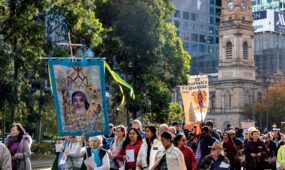Human face of war
Opinion
Forty one years ago I spent six months on Kibbutz Nir Oz in the Negev Desert of Israel, just a few kilometres from the Gaza strip.

It was one of the best experiences of my life, but also one of the most confronting. I fell in love with the ‘kibbutzniks’ and their unique way of life. I was amazed by how they had transformed the barren land into an oasis with irrigated fields of cotton, mango groves and other thriving enterprises.
But I also felt a deep empathy and sorrow for the Palestinians in Gaza, some of whom worked on our kibbutz and whom I befriended to the point where they took me into their homes in Gaza on two occasions. Their generosity, hospitality and goodwill under such adverse conditions was astounding.
Advertisement
While I was there the Gaza strip was more accessible than it is today but it was still a place where lack of freedom, opportunity and basic human rights created an overwhelming sense of hopelessness.
It was also a time when the Israeli army invaded southern Lebanon to combat rocket attacks from the Palestinian Liberation Organisation on settlements in the north of the country. It was a time when the men of our kibbutz were called up overnight to go to war. A friend’s husband died in combat and I attended his funeral. The wailing of his grieving relatives was like nothing I’d heard before.
Many of the Israelis I met did not agree with their government’s treatment of the Palestinians and I attended a rally in Tel Aviv where thousands turned out in protest at the war in Lebanon.
Last month, my kibbutz – Nir Oz – was attacked by Hamas. I first heard the shocking news on the radio and when I checked with the Volunteers of Kibbutz Nir Oz Facebook group I saw a post confirming the reports.
 Initially I thought, and hoped, it was an exaggeration, or propaganda, and that perhaps only a few people had been killed or taken hostage.
Initially I thought, and hoped, it was an exaggeration, or propaganda, and that perhaps only a few people had been killed or taken hostage.
Then I saw a post that said one in four people from Kibbutz Nir Oz had been killed or abducted. This really hit home. Although four decades had passed, I wondered if any of my friends or the children I cared for were among them. (In the early days of kibbutzim, a collective community, the children didn’t live with their parents. This enabled women to work in the same roles as men.)
Memories of volunteer parties, including my 21st, in our connecting huts were revived when I saw photos and videos of the gutted homes after the deadly Hamas attack. A Nir Oz family of five were killed and among those taken hostage were founding members of the kibbutz, Oded Lifshitz, 83, and his wife, Yocheved, 85. Ironically, they were peace activists who regularly transported patients from Gaza to receive medical treatment in Israeli hospitals. Yocheved was freed with another captive for humanitarian reasons on October 23.
Advertisement
My thoughts turned to the fate of the families who invited me into their homes in Gaza. They have been living in what many describe as the world’s largest ‘open-air prison’ for the past 16 years. Now they are among the innocent victims of Israel’s drastic response to the terror inflicted by Hamas, forced to flee their bombed homes and facing dire shortages of food, water and fuel.
For decades the United Nations and many world leaders, including US presidents, have been calling for a two-state solution to the Israel-Palestine conflict. Successive peace accords have failed.
Critics of the two-state solution claim on the one hand that the threat to Israel’s existence is too great while the other side argues that Israel has encroached on so much land in the Palestinian territories that a separate state isn’t viable. The rise of the militant Hamas in Gaza and the return to power of the right-wing Benjamin Netanyahu has made the prospect of two separate states co-existing less likely than ever.
The sad part is that one of the most memorable aspects of any visit to the Holy Land is to visit Jerusalem and see Muslims, Christians and Jews living together harmoniously in the old city.
Media commentators expressed surprise when Israeli hostage Yocheved Lifshitz, on her release, shook hands with a Hamas official and said ‘shalom’. But surely this is exactly what is needed to, in the words of John Lennon, ‘give peace a chance’.







